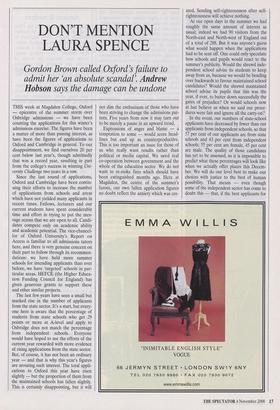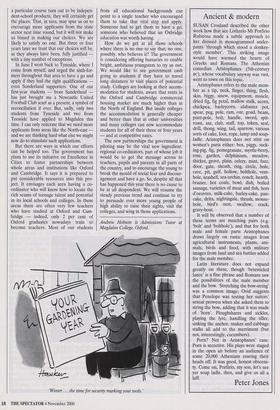DON'T MENTION
LAURA SPENCE
Gordon Brown called Oxford's failure to
admit her 'an absolute scandal'. Andrew Hobson says the damage can be undone THIS week at Magdalen College, Oxford — epicentre of the summer storm over Oxbridge admissions — we have been counting the applications for this winter's admissions exercise. The figures have been a matter of more than passing interest, as have been the figures of applications to Oxford and Cambridge in general. To our disappointment, we find ourselves 20 per cent below last year's, though admittedly that was a record year, resulting in part from the college's success in winning Uni- versity Challenge two years in a row.
Since the last round of applications, Oxford and Cambridge have been contin- uing their efforts to increase the number of applications from schools and areas which have not yielded many applicants in recent times. Fellows, lecturers and our current students have spent considerable time and effort in trying to put the mes- sage across that we are open to all. Candi- dates compete only on academic ability and academic potential. The vice-chancel- lor of Oxford University's Report on Access is familiar to all admissions tutors here, and there is very genuine concern on their part to follow through its recommen- dations: we have held more summer schools for intending applicants than ever before, we have 'targeted' schools in par- ticular areas. HEFCE (the Higher Educa- tion Funding Council for England) has given generous grants to support these and other similar projects.
The last few years have seen a small but marked rise in the number of applicants from the state sector. It's a start, but every- one here is aware that the percentage of students from state schools who get 29 points or more at A-level and apply to Oxbridge does not match the percentage from independent schools. Everyone would have hoped to see the efforts of the current year rewarded with more evidence of rising applications from the state sector. But, of course, it has not been an ordinary year — and that is why this year's figures are arousing such interest. The total appli- cations to Oxford this year have risen slightly — but the proportion of them from the maintained schools has fallen slightly. This is certainly disappointing, but it will not dim the enthusiasm of those who have been striving to change the admissions pat- tern. Five years from now it may turn out to be merely a pause in an upward trend.
Expiessions of anger and blame — a temptation to some — would score head- lines but end up as counterproductive. This is too important an issue for those of us who really want results rather than political or media capital. We need real co-operation between government and the whole of the education sector. We do not want to re-stoke fires which should have been extinguished months ago. Here at Magdalen, the centre of the summer's furore, our own fallen application figures no doubt reflect the anxiety which was cre- ated. Sending self-righteousness after self- righteousness will achieve nothing.
At our open days in the summer we had roughly the same amount of interest as usual; indeed we had 90 visitors from the North-east and North-west of England out of a total of 288. But it was anyone's guess what would happen when the applications had to be sent off. One could only speculate how schools and pupils would react to the summer's publicity. Would the shrewd inde- pendent school advise its students to keep away from us, because we would be bending over backwards to favour maintained school candidates? Would the shrewd maintained school advise its pupils that this was the year, if ever, to batter down successfully the gates of prejudice? Or would schools now at last believe us when we said our proce- dures were fair and ignore all the carry-on?
In the event, our numbers of state-school applicants have decreased by fewer than our applicants from independent schools, so that 57 per cent of our applicants are from state schools and 43 per cent from independent schools; 55 per cent are female, 45 per cent are male. The quality of those candidates has yet to be assessed, so it is impossible to predict what these percentages will look like when we actually offer places this Decem- ber. We will do our level best to make our choices with justice to the best of human possibility. That means — even though some of the independent sector has come to doubt this — that, if the best applicants for a particular course turn out to be indepen- dent-school products, they will certainly get the places. That, in turn, may spur us on to encourage more applicants from the state sector next time round, but it will not make us biased in making our choices. We are likely to satisfy no one. But three or four years later we trust that our choices will be, as they always have been, fully justified with a tiny number of exceptions.
In June I went back to Tyneside, where I come from myself, and urged the sixth-for- mers throughout that area to have a go and apply if they had the right qualifications even Sunderland supporters. One of our first-year students — from Sunderland has just brought me a Newcastle United Football Club scarf as a present, a symbol of reconciliation if ever. But, sadly, only two students from Tyneside and two from Teesside have applied to Magdalen this time. I can only reiterate that we need more applicants from areas like the North-east and we are thinking hard what else we might now do to stimulate such applications.
But there are ways in which our efforts can be helped too. The government has plans to use its initiative on Excellence in Cities to foster partnerships between whole areas and institutions like Oxford and Cambridge. It says it is prepared to put considerable resources into this pro- ject. It envisages each area having a co- ordinator who will know how to locate the rich seams of teenage talent and potential in its local schools and colleges. In these areas there are often very few teachers who have studied at Oxford and Cam- bridge — indeed, only 2 per cent of Oxford graduates nowadays train to become teachers. Most of our students from all educational backgrounds can point to a single teacher who encouraged them to take that vital step and apply. Someone had to get them to have a go; someone who believed that an Oxbridge education was worth having.
How do we get at all those schools where there is no one to say that; no one, possibly, who believes it? The government is considering offering bursaries to enable bright, ambitious youngsters to try us out. We would like to see government cash going to students if they have to travel long distances to visit places of potential study. Colleges are looking at their accom- modation for students, aware that rents in the Oxford and Cambridge commercial housing market are much higher than in the North of England. But inside colleges the accommodation is generally cheaper and better than that at other universities and many colleges can now accommodate students for all of their three or four years — and at competitive rates.
The new partnerships the government is piloting may be the vital new ingredient: regional co-ordinators, part of whose job it would be to get the message across to teachers, pupils and parents in all parts of the country, and to encourage the young to break the mould of social fear and discour- agement and have a go. So, despite all that has happened this year there is no cause to be at all despondent. We will resume the steady previous trend and continue to try to persuade ever more young people of high ability to raise their sights, visit the colleges, and wing in those applications.
Andrew Hobson is Admissions Tutor at Magdalen College, Oxford.



























































































 Previous page
Previous page